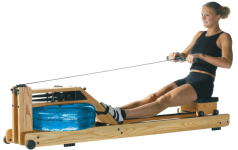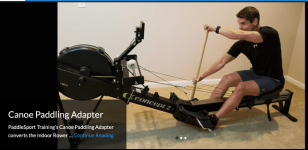- Joined
- Nov 22, 2021
- Messages
- 297
- Reaction score
- 169
I guess my first question is, do you do any paddling specific training?
Do you make an effort to keep your paddling muscles strong through the winter and, in better weather, do you go out paddling with the main purpose being to get stronger?
If you do train, what do you do?
At 71, I don't feel like I can take my fitness for granted. It's a losing battle to stay strong.
I have a Total Gym and some barbells and dumbbells and I hit them hard through the winter months, concentrating on muscles I use for paddling and for loading my boats onto my truck and, even getting in and out of my boat. I use my indoor bike to keep my cardio in good shape.
When the ice melts and the water warms up a bit, I try to make it to a local lake about three times a week and I'm not just there to gawk.
I have paddles with different blade sizes and one thing I want to try, when spring gets here, is to do some paddling with a larger than normal blade and some paddling with a smaller than normal blade. I might even combine them in the same workout, maybe doing a lap around the lake with the large blade then a lap with a small blade. I wonder if racers ever use this training technique.
Do you make an effort to keep your paddling muscles strong through the winter and, in better weather, do you go out paddling with the main purpose being to get stronger?
If you do train, what do you do?
At 71, I don't feel like I can take my fitness for granted. It's a losing battle to stay strong.
I have a Total Gym and some barbells and dumbbells and I hit them hard through the winter months, concentrating on muscles I use for paddling and for loading my boats onto my truck and, even getting in and out of my boat. I use my indoor bike to keep my cardio in good shape.
When the ice melts and the water warms up a bit, I try to make it to a local lake about three times a week and I'm not just there to gawk.
I have paddles with different blade sizes and one thing I want to try, when spring gets here, is to do some paddling with a larger than normal blade and some paddling with a smaller than normal blade. I might even combine them in the same workout, maybe doing a lap around the lake with the large blade then a lap with a small blade. I wonder if racers ever use this training technique.


